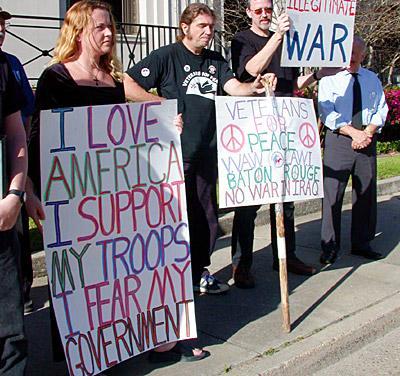Increased anti-war sentiments have been seen on campus since President George W. Bush addressed the nation and started disarming Iraq.
A group of people started protesting at 4 p.m. Thursday in front of the Federal Building and U.S. Court House in response to the conflict, including LSU members of the Coalition for Alternatives to War with Iraq.
Every five minutes, a car passing by honked at the signs saying, “wage peace” and “read my lips … no new war.”
Usually, between 40 and 50 people protest in front of the Federal Building, but Thursday, CAWI member Robert McDonald said he hoped more would show up wearing all black as a warning.
The protest was an immediate response to military actions taken on Iraq in the past two days.
Jessica Brandow, a CAWI member and international studies sophomore, said many people ask her what they can do to oppose the war, and when she tells them, they do not show up at events such as the protest.
She said she does not understand how killing innocent people is a justified means to get a person’s political points of view across.
“These are real people,” Brandow said. “Dead isn’t liberated.”
The security officers and police at the Federal Building refused to comment on the protest.
Gov. Mike Foster released a statement supporting the war Thursday.
“I fully support President Bush in his decision to end diplomatic efforts and to take action against a terrible dictator,” Foster said. “Saddam Hussein is a threat not only to America and to his own people, but to the entire free world.
“He has thumbed his nose at the United Nations for twelve years now, and it is time for him to go.”
CAWI was established during the summer of 2002 by a mixture of people from the community and LSU to try to promote public understanding about Iraq, said Paula Henderson, CAWI member.
McDonald said he does not agree with Bush’s reasons for going to war. He said the preemptive attack will push people to extremes and into terrorists groups when they normally would not join such organizations.
Mark Gasiorowski, an international relations professor, said the anti-American sentiments have become intense and almost universal.
“It’s going to be worse after this war,” he said. “We’re killing Arabs and they see this as American imperialism … people will volunteer for al-Qaida.”
Gasiorowski said 94 percent of people in Turkey are against the United States going into Iraq.
LSUPD Capt. Ricky Adams said there are things being done continually in efforts to prevent terrorism, specifically in response to the war in Iraq.
Adams said he has been in contact with federal agencies and homeland security agencies in response to the orange terrorist threat.
Despite the heightened alert, in the past 12 years, Saddam Hussein has not caused any problems for the United States, Gasiorowski said.
“Hussein is not a threat to the United States,” Gasiorowski said.
He said North Korea is more of a threat to the United States than Iraq. North Korea has 10,000 artillery pieces aimed at Seoul, the South Korean capital, so the United States is not talking to North Korea, he said.
“I think we should be talking to them,” Gasiorowski said.
Rachel Graham, a protester who was not involved in CAWI, said she came because she has not seen much evidence of an anti-war protest in Baton Rouge.
“I feel that all we’re doing as a nation is further isolating ourselves,” she said.
Arthur Buehler, philosophy and religious studies assistant professor, said there was a conference in Switzerland addressing the concern that the war on Iraq will cause a worldwide depression.
“We can already see the American economy going down,” Buehler said.
LSU will be affected by the war because it is in one of the poorest states in the country, he said.
“To say something in one part of the world will not affect us is naive,” Buehler said. “That is the same argument to justify intervention.”
He said the reasons for going to war reach far beyond just oil profits. Hussein was going to change the currency to the Euro — the dollar’s counter currency — which would cause serious economic problems for the United States.
“The circumstances under which war has come about has really undermined global security and diplomatic efforts by people for 30 years,” Buehler said.
In reference to the Iraqi people, he said he urges people to put themselves in their shoes. He said imagine what it would be like if a country that did not like the U.S. President came into the United States with an army and overthrew the government.
“That’s the question,” Buehler said. “Who wants people to bomb their country?”
Fighting different battles
March 21, 2003

Fighting different battles



